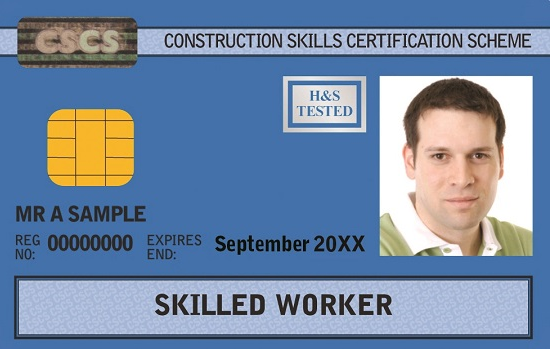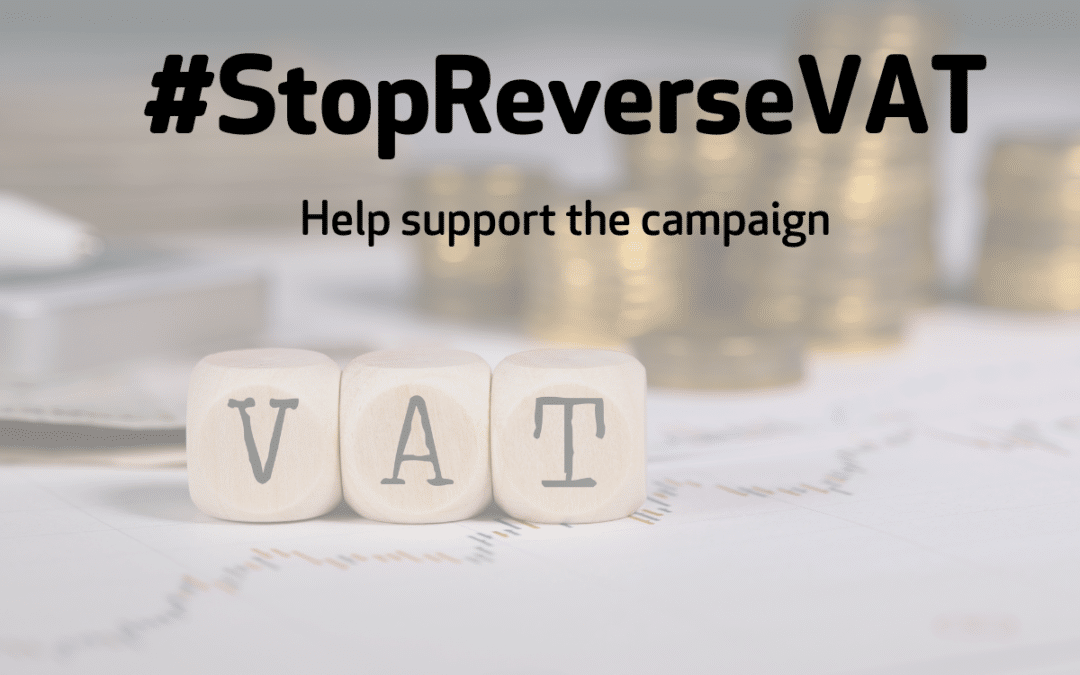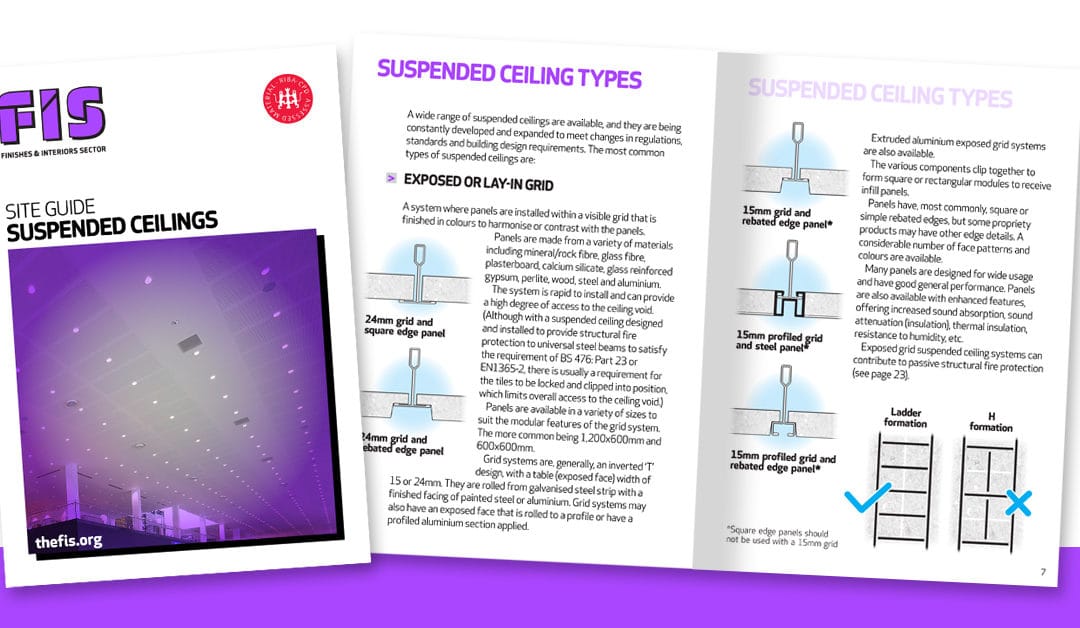
by Clair Mooney | Mar 1, 2021 | Membership
FIS Technical Director Joe Cilia will deliver a seminar as part of UK Construction Week on 9 March to discuss Compliance and Comptetency.
Specifiers who choose to use companies that are ‘Code Compliant’ can be assured that the claims made about a product are clear, accurate, up-to-date, accessible and unambiguous, and that where manufacturers work to the recommendations in the recent report ‘Raising the Bar’ have something to measure the competency of everyone in the supply chain in setting the specification and importantly addressing the risk point in procurement when products can get substituted in isolation of the system or where they interface with other elements.
The seminar will take place on 9 March at midday. To register visit https://www.ukconstructionweek.com/net-zero-housebuilding-registartion-9-march

by Clair Mooney | Feb 25, 2021 | Skills
From April 2021, any adult aged 24 and over who wants to achieve their first full level 3 qualification, which is equivalent to a technical certificate or diploma, will be able to access almost 400 fully funded courses. The qualification list will be updated each month. Awarding Organisations will work with the DfE and industry to ensure further courses are added to this list where there is demand and they meet DfE requirements. The list of 400 qualifications currently include the following Level 3 outcomes applicable to the finishes and interiors sector:
- Site Carpentry
- Bench Joinery
- Decorative Finishes – Painting and Decorating
- Kitchen Installation Skills
- Ceiling Fixing
- Plastering
- Wall and Floor Tiling
- Installing Construction Anchors and Site Testing
- Occupational Work Supervision
- Leadership and Management
If you would like a qualification added to this list please contact FIS either by emailing info@thefis.org or call 0121 707 0077. For the full list please see the List of qualifications included in the National Skills Fund – level 3 Adult offer

by Clair Mooney | Feb 22, 2021 | Skills
On 1 April 2021 CITB will be increasing the price of the Health, Safety and Environment (HS&E) test products by £1. This price increase was delayed by a year due to COVID-19. It will ensure that CITB can continue to invest in the test, so that it remains up to date against the expanding H&S requirements of construction and that delivery is accessible and trustworthy.
The new prices will be £22.00 for the test, the CITB HS&E revision test app will be £6.99 and mobile testing will cost £31.00. You can book a test here, and if you would like more information regarding this price change, please contact the CITB HS&E testing service team at hsetestdev@citb.co.uk

by Clair Mooney | Feb 22, 2021 | Skills
A proposed offer to industry stating what priorities CITB has identified in order to train and qualify the construction industry and how CITB levy will be collected for the next three years, 2022 to 2025, will be distributed in April 2021.
This is not a vote to retain or close CITB, that decision is a lot more complicated and involves the Minister of State and Parliament. To ensure members of the Finishes and Interiors Sector get a say in how much Levy CITB can collect from the construction industry you must ensure:
- You complete your CITB Levy return on time.
- You ensure you state you are a member of the Finishes and Interiors Sector at section 1a of the return. Levy_Return_Guidance_Notes
Further guidance will be available from 1 March 2021 when the CITB proposed offer (the priorities for construction and levy collection) will be distributed via multiple means eg online, websites and news media. CITB will confirm to FIS the number of Levy paying employers and the value of their CITB Levy contribution. The final amount of levy to be collected will be confirmed in CITB’s final offer in June 2021, once the proposed plans are approved.
In order to provide information so that members can make an informed decision The Finishes and Interiors Sector will produce a position statement in June 2021. We will also be dealing directly with our Levy paying employer members and will have already been in regular contact with their Levy contact. When issuing the survey, we will send this directly to our Levy contacts and the CEO, as we will expect the CEO to be responding to the question on behalf of the company. We do however expect the Levy contact to ensure the CEO has all the relevant information to allow them and their Board to decide on how the organisation should respond to the question.
Although it is yet to be confirmed the Finishes and Interiors Sector will distribute the CITB consensus survey when it is available. Your responses will be presented to the FIS Board in early September 2021. The final response must be sent to CITB before the end of September 2021. The Consensus Survey window will close on Sunday 15 August 2021.
The two measures used to demonstrate consensus has been achieved using reasonable steps to consult will be:
- More than 50% of levy payers.
PLUS
- More than 50% of levy payable by employers that support the proposals (the value of what is to be collected)
Data from the 2017 Levy Consensus Results for Build UK:
|
Trade Associations |
Levy Payable |
| FINAL TRADE ASSOCIATION TOTAL |
26 |
£25,513,143 |
| Yes |
21 |
91% |
£20,911,130 |
98.21% |
| No |
2 |
9% |
£381,218 |
1.79% |
| Abstains |
2 |
N/A |
£4,075,216 |
N/A |
| No Response |
1 |
N/A |
£145,580 |
N/A |
Please remember to ensure you have an opportunity to vote:
- You complete your CITB Levy return on time.
- You ensure you state you are a member of the Finishes and Interiors Sector at section 1a of the return.

by Clair Mooney | Feb 22, 2021 | CSCS, Main News Feed
Update 22.1.2021
HS&E Tests
There have been updates to the provision of HS&E Testing across all three nations. Testing remains in place in England and has resumed again in Wales, but in Scotland, updated government guidance has meant Pearson VUE have ceased delivery of testing. Ensure you check CITB’s Urgent Messages page for the latest information before trying to book. Or check the Pearson- VUE web site and look at country-specific testing information https://home.pearsonvue.com/coronavirus-update
Pearson Vue have are regularly updating their Country-specific testing information with details of what is happening in each country. The latest information includes this statement: You must bring and wear your own face mask while at a Pearson VUE-owned test centre and throughout your exam. Any surgical or cloth face mask, including a homemade face mask, is acceptable as long as your nose and mouth are fully covered. Face masks with exhalation valves and face shields are not acceptable. Candidates without a face mask will be denied testing services. Pearson Vue are unable to provide face masks to candidates.
Candidates are encouraged to check your test confirmation email or letter for details of safety measures at the Test Centre including the requirement to wear face coverings, or for any changes to your scheduled appointment. Limited capacity may cause delays in booking a test.
Visit CITB’s urgent messages page for further information on test centre availability across the whole of the UK. CITB are working alongside their partners to increase the testing capacity, so please continue to visit the CITB website to check for availability and to book your test.
COVID – 19 Position CSCS
A key requirement for all applications (new or renewal) is proof that the applicant has passed the relevant CITB Health, safety and environment (HS&E) test within the last 2 years. Based on COVID-19 issues CSCS is requesting employers and those responsible for site access and card checking procedures to use their discretion towards workers whose cards have expired since mid-March onward and who can provide evidence that they have been unable to sit their test or undertake the required training as a result of the closure of Test and Training centres. This is at the employer’s discretion until the situation has stabilised.
What steps are CSCS taking?
CSCS recognise that construction workers may face delays in obtaining a card while test centres cannot run at full capacity or are required to close. Therefore, they are asking the industry to continue to support the following temporary measures:
- Employers and those responsible for site access and card checking procedures to use their discretion towards workers whose cards have expired since March onward. But a worker must always hold the correct card for the job they do on site.
- CSCS has extended the grace period for card renewals from 6 months after the card expires to 12 months. This means that the card can be renewed, once the CITB HS&E test has been passed, up to one year from the card’s expiry date. This will assist those applicants struggling to find availability to sit the test and renew their card.
CSCS will continue to monitor the situation and where necessary introduce further proactive measures to limit the impact on CSCS applicants and the wider industry. You can visit www.cscs.uk.com/covid19 for the latest updates from CSCS.
What to do if your card has been expired for more than a year
If your CSCS card was issued via Industry Accreditation you will be required to appeal for late renewal, the appeals process can be found at
www.cscs.uk.com/appeals. If you achieved your CSCS card by achieving the NVQ or SVQ you can submit a new application and provide a copy of your NVQ or SVQ along with confirmation of passing the CITB Health, safety and environment test within the last 2 years.
“Lite Health and Safety Test”
Where it is not currently possible for individuals to renew their CSCS Cards or take the H&S Test. CITB has initiated a ‘lite’ Health and Safety test as a temporary measure, so employers can assess the health and safety knowledge of individuals.
Note this is an interim and only to be used where testing capacity is limited. It is designed to help employers run their own in-house interim testing to give a level of local assurance that an employee is safe to work on their site. Permission to allow the employee on site is at the discretion of the employer. Suggested test delivery guidelines are available to download here.
This product is free to download from the following sources:
CITB: LITE Operatives and Specialist HS&E TEST only
CITB: LITE Managers and Professionals HS&E TEST only
Further Information
CSCS for information on card registrations and renewals and more detail on the H&S Test click here.
The easiest way to apply for a CSCS card is online: https://www.cscs.uk.com/applying-for-cards/ or download the App MyCSCS (in Android or iOs)
More information is available online from CITB on CSCS Tests is available here.
Important test delivery information pertaining to COVID-19 (coronavirus) (note the section for various parts of the UK, construction is deemed as essential, so testing should carry on, but check the status for your local test centre to ensure there are no local issues).
Further information from CSCS is shown here.
To visit the FIS COVID-19 Hub Click here

by Clair Mooney | Feb 22, 2021 | Market data
The Q4 Construction Trade Survey signals a continued, but tentative, recovery for the construction industry following the disruptions to activity from Covid-19 between March and May. SME building contractors and chartered surveyors recorded an increase in workloads during Q4, whilst product manufacturers on both the heavy side and the light side reported quarterly increases in sales.
FIS members can download the report here. More data from the CPA is available within our Membership Hub.

by Clair Mooney | Feb 16, 2021 | Main News Feed
The rules for using the UKCA and the UKNI images have added additional instructions regarding the height of the markings. This now state under “Rules for using the UKCA image” and “Rules for using the UKNI image”:
- “the UKCA marking is at least 5mm in height for the whole logo, not individual letters – unless a different minimum dimension is specified in the relevant legislation.”
- “the UKNI marking is at least 5mm in height for the whole logo, not individual letters – unless a different minimum dimension is specified in the relevant legislation.”
Previously this only stated “the UKCA (or the UKNI) marking is at least 5mm in height – unless a different minimum dimension is specified in the relevant legislation.
Please click here to view the updated government guidance for using the UKCA marking and here for using the UKNI marking.

by Clair Mooney | Feb 11, 2021 | Membership
RThe #StopReverseVAT campaign is off to a great start reaching more than 1.2 million social media users in its first week.
Whilst the Treasury’s position is still to introduce Reverse VAT on 1 March, the campaign is gathering pace and traction with an Early Day Motion being tabled by Kirsten Oswald MP calling for the Government to reconsider the implementation of Reverse VAT. Early Day Motions are a great way of drawing attention to subjects and increasing support for this motion is an excellent way of raising the profile of Reverse VAT within parliament. Kirsten has also contacted Build UK offering her support for the campaign.
Build UK has issued a press release in response to the Chancellor’s Plan for Jobs and Andy Steele, Vice Chairman of Build UK, spoke directly to the Construction Minister, Anne-Marie Trevelyan, urging her to raise the issue of Reverse VAT with her colleagues in the Treasury and make sure that they fully understand its impact on the industry and the supply chain.
Keep up the pressure
With the amount of interest already being shown, we want to keep up the pressure on the Government to withdraw the Reverse VAT legislation. You can really help by:
- Writing to your Member of Parliament:
- highlighting the damaging impact Reverse VAT will have on your business, sector and the construction industry
- including the Reverse VAT Factsheet
- asking them to support Early Day Motion (EDM) 1466
- Sharing more postcards using your Trade Association branding to show the range of sectors supporting the campaign
- Liking, retweeting and commenting on social media postings that have used #StopReverseVAT
- Include @HMTreasury @Jesse_Norman @RishiSunak @Annietrev #PlanforJobs in your postings on social media.
Read more on how the campaign to stop Reverse VAT is gaining momentum.

by Clair Mooney | Feb 10, 2021 | Membership
FIS has launched a revised and updated Site Guide for Suspended Ceilings to help a project team fully understand the requirements of the suspended ceiling contractor.
The Site Guide for Suspended Ceilings was produced by the FIS Ceilings and Absorbers working group which comprises representation from manufacturers, suppliers and contractors involved in the design, supply and construction of ceiling systems. The site guide is intended to help main contractors, designers and project managers to understand the terminology, descriptors and different ceiling systems used, and the process of delivery, handling and planning the installation. It also provides an understanding of the site conditions, the plant and access equipment needed as well as highlighting the key health and safety points and requirements from the Construction (Design and Management) Regulations 2015 (CDM).
“In publishing this guide, FIS’s aim is to help the project team achieve a completed building that looks and functions to its full design potential. It is not intended as a definitive technical manual, but rather a framework that will support main contractors, site managers/supervisors, designers, engineers and others involved through the building process.”
Iain McIlwee, FIS Chief Executive
The early appointment of a specialist suspended ceiling contractor who has the necessary experience and resources to achieve satisfactory completion is of major importance whilst contractor membership of FIS will be a significant indicator of a contractor’s suitability.
The guide sits alongside other FIS best practice guides that relate to ceilings:
Installation of suspended ceilings
Selection and installation of top fixings for suspended ceilings
Maintenance and access into suspended ceilings
Recommendations for the Safe Ingress of Plasterboard
Health and safety handbook
In addition, the new specifiers guide to suspended ceilings will be available in Spring 2021.
These guides work well when they are included in proposals and project plans to demonstrate how to best approach a project. They are also good indicators if a contractor puts the guide forward as part of a submission of a contractor’s ability to deliver the ceiling installation to the required standard and are an excellent introduction to new members of the team and any trainees and apprentices.
You can download the Site Guide for Suspended Ceilings here.

by Clair Mooney | Feb 10, 2021 | Skills
Qualifications in Wales have announced alternative assessment arrangements for Essential Skills Wales qualifications. Centres will be able to provide a Centre Determined Grade for learners who are unable to access the adapted methods of assessments due to the impact of COVID-19. The arrangements will allow greater flexibility for centres to support as many learners as possible to complete their qualifications by allowing a wider range of evidence to be used to demonstrate the learner has the relevant skills. The alternative assessment arrangements will apply to all Essential Skills Wales qualification: Application of Number, Communication, Digital Literacy and Employability, including Entry Level, and will be available to learners due to complete their qualifications before 31 August 2021.
What this means
- Where learners are able to complete the adapted assessments, they can continue to do so. The adaptations to the assessments remain in place and remote assessment and invigilation options are being made available.
- If learners are unable to complete their assessments, the centre may consider delaying the assessment until later in the course if this is unlikely to cause a negative impact for the learner.
- If learners are likely to be negatively impacted by a delay and there is a risk to their successful completion of the qualification and future progression, then the centre can move to a Centre Determined Grade approach.
- Centres will need to inform their awarding body if they intend to use Centre Determined Grades.
- The Centre Determined Grade must be supported by good evidence that shows that the learner has demonstrated they have the necessary essential skills at the relevant qualification level.
- Awarding bodies will provide further guidance on the types of evidence that can be used and on the quality assurance arrangements in early March.
Qualifications in Wales understand that many learners are waiting to complete their Essential Skills Wales qualifications so that they can progress to employment or further study. This approach allows flexibility in how learners complete their Essential Skills Wales qualifications while disruption to teaching and assessment continues and allows centres to make decisions that are in the best interests of their learners.

by Clair Mooney | Feb 10, 2021 | Skills
Apprentices can support your plans for the future.
To help support employers who hire an apprentice, additional incentive payments for taking on an apprentice have been extended to 31 March 2021. This includes hiring redundant apprentices.
George Swann, FIS Skills and Training Lead said: “This is great news for all finishes and interiors organisations with the capacity to take on an apprentice, but have been restricted by the current lockdown. If you have not given any thought to employing an apprentice and feel you have capacity it is well worth considering as these incentive payments enhance the benefits of adding an apprentice or two to your workforce”.
Some of the benefits of hiring a redundant apprentice include:
- a quick return on investment as you’ll have a work-ready apprentice who already has relevant skills and experience
- finding the right skills you need to boost your organisation
- supporting an enthusiastic apprentice who has lost their job with a new opportunity
FIS produced guidance explaining the apprentice incentives and how they are accessed. Full details here.
There is also a document ‘Apprentices – Guidance for Employers’ https://www.thefis.org/skills-hub/apprenticeships/ which has information to help you recruit an apprentice and access all the funding your organisation may be eligible for.
Following this announcement the ESFA Apprenticeship Agreement for Employers has been updated.
The latest version of the agreement will be available for employers to accept through their apprenticeship service account from 1 Feb 2021. Employers will need to accept the latest agreement if they wish to apply for incentive payments for apprentices who start their apprenticeship between 1 Feb 2021 and 31 March 2021, where they are eligible to do so.

by Clair Mooney | Feb 2, 2021 | Main News Feed
The latest results published under the Duty to Report on Payment Practices and Performance show that the payment performance of Build UK members has continued to improve over the last six months despite the significant challenges presented by the coronavirus pandemic. Contractor members are now reporting an average of 35 days to pay invoices, down from 36 days last July and 45 days when the Build UK table was first published in July 2018. On average, they now pay 93% of invoices within 60 days, up from 82% two years ago, and 79% of their invoices are paid within terms, compared to 61% in 2018.
The Build UK table features more than 100 of the industry’s largest companies, including contractors, clients and housebuilders, to provide a comprehensive picture of payment practices across the construction industry.

by Clair Mooney | Feb 2, 2021 | Membership
Companies that deferred VAT between 20 March and 30 June 2020 can either make payment in full by 31 March 2021 or opt in to the VAT deferral payment scheme when it launches shortly. The new scheme will allow companies to repay their VAT in up to 11 interest‐free monthly instalments until March 2022, rather than in one lump sum.

by Clair Mooney | Jan 29, 2021 | Skills
North West Skills Academy, an FIS Approved Training Provider Member, has secured funding to support FIS members that are looking to get the existing workforce qualified.
This is a unique opportunity to show investment in employees and beat the ‘starting gun’ that will see a rush of organisations and independent operatives looking to achieve qualifications when the Building Safety Bill is implemented. Proof of competence in an occupation is going to become a ‘must have’ and a qualified workforce will prepare your organisation for future work. In addition, for those registered with CITB the GET Code fund and FIS Training Group Supplementary fund makes these qualifications cost zero.
If you are interested, you can find out more by visiting https://www.nwskillsacademy.co.uk/commercial-application
100% Funded One Day Assessment NVQ Assessments
Experienced Worker Practical Assessment (EWPA)
- NVQ Level 2 in Dry Lining Fixing
- NVQ Level 2 in Dry Lining Finishing
- NVQ Level 2 in Joinery
- NVQ Level 2 in Wall & Floor Tiling
- NVQ Level 2 in Painting & Decorating
Registration proces:
- Register and pay North West Skills Academy
- Provide work history (5 years) and witness testimonies
- Attend and complete one day assessment
- Claim CITB GET code
- Present the invoice and claim FIS Training Group Supplementary Fund. This funding is limited and will not be available forever for details contact FIS.
Preston Assessment Centre, Units 3,4 & 33, Momentum Place, Preston, PR5 6EF
Stoke Assessment Centre, Unit 46, Marcus House, Longton, Stoke-on-Trent, ST3 5XA
For more details please call: 0161 442 4344 and press option 1 or email nvq@nwskills.academy.co.uk

by Clair Mooney | Jan 29, 2021 | Skills
We are receiving reports regarding the mental health of colleagues during this lockdown and are often asked to provide information to assist employer members, here is some of the information available. The FIS Approved Training Provider members offer discounts, and a number of courses are free of charge.
For all training provided by FIS Approved Training Providers please see: https://www.thefis.org/skills-hub/training-and-qualification/provisions/ then open the tabs at the top of the table.
Mental Health First Aid – HSS – https://www.hsstraining.com/search?search=Mental+health
eLearning Courses:
The FIS #BuildersBrew Health Campaign is still running, please see: https://www.thefis.org/about-us/builders-brew/

by Clair Mooney | Jan 29, 2021 | Skills
Independent Fire Inspections is launching its new online course, Preparing for IFE Level 3 Exam Passive Fire Protection, on 1 February 2021. The course has been developed for eLearning, to provide training and the necessary preparation for those looking to sit their Level 2 and Level 3 Passive Fire Protection Exams with the Institute of Fire Engineers. All materials and tests are online, leading to a final exam that can be carried out with the IFE directly in March or October each year.
The Institute of Fire Engineers has provided their recognition for this course and it has also been Accredited by the Institute of Fire Safety Managers. What does this mean? Two respected industry institutions have reviewed this training course and the quality of Independent Fire Inspections Ltd as a training provider, have deemed them acceptable and are willing to recommend them.
Independent Fire Inspections Ltd.’s Director, Ben Freeman has said “We are really pleased to be launching this comprehensive course to the industry, the first of its kind in E-Learning format, having evolved our current courses and added a lot more content, we are excited to begin delivering this online. All of our own inspectors and team members have been instrumental in pulling the course together along with industry experts.”
The course is being offered at an introductory discounted cost, please contact Claire.turner@fireinspections.co.uk for further information.
The course can be purchased directly via the website https://fireinspections.co.uk/product-category/e-learning-courses

by Clair Mooney | Jan 29, 2021 | Skills
The CITB online events in March and April will cover how they propose employers will be assessed to CITB Levy over the next three years. In the past year they’ve been in regular contact with many employers and industry bodies. The collection of the Levy Assessment in 2020 was temporarily suspended and the Levy rates for assessment in 2021 have been reduced by half. At the same time, they have prioritised direct financial support for employers and apprentices.
Now, as they look at the best means to contribute to industry’s recovery in the months ahead, your view can shape the way forward. At the events they’ll share how Levy registered employers can take part in consultation on the Levy Proposals 2022-25 and have their say on the proposed areas of support for construction businesses.
If you are a Levy registered employer and wish to join CITB please register here.

by Clair Mooney | Jan 29, 2021 | Labour, Membership, Skills
In a report on CNews today, FIS has continued to raise concerns about potential labour shortages.
Iain McIlwee, FIS CEO commented: As the article in CN news reflets, the extent of the immigration issue is still very much unknown, but it is concerning, especially in our sector where over 40% of the workforce is from the EU. What we do know is that over 40% of our members are currently reporting a shortage and 60% are expecting one, how bad it will get we don’t fully know right now, but we anticipate that it will impact rates and programmes. The problem has two parts, the immediate concern over who will stay and settle, we are trying to understand the cliff ledge post-Christmas and there is potentially another one coming in the summer when the Right to Works checks kick in. But, that is only part of the problem – even if all the EU workers return and stay, our annual recruitment and training target has doubled over night, because many trades do not make it on the skilled or shortage occupation list and so the EU tap is well and truly off. If just 5-10% opt to ply their trade within the EU instead, this target triples, quadruples and so on. This is the number one concern for the FIS as we move into 2021 – the infrastructure and time just isn’t in place to solve this – realistically we need to see some relaxation of the rules to give us time to transition.
Read the full article here: Labour shortages could raise rates ‘at least 10%’

by Clair Mooney | Jan 29, 2021 | CSCS, Main News Feed
CSCS has launched virtual CSCS cards providing instant access to an individual’s training and qualification records. Virtual cards carry all the same information as physical cards but are stored within the My CSCS app, which is free to download via Google Play and Apple Store.
Virtual cards benefit the card holder and their employer by providing both with instant access to the individual’s training and qualification records and eliminating the need to carry a physical card on site.
Alan O’Neile, Head of Communications at CSCS said: “This is a game changer for CSCS cards. The technology will improve safety and efficiency on construction sites by making it easier for the employer to check that workers hold the appropriate qualifications and training for the job they do on site.”
The virtual card is generated automatically and can be downloaded to the My CSCS app as soon as an application is approved, and payment is taken. The virtual card can then be used immediately on site before the traditional plastic card has arrived in the post. CSCS is keen to highlight to employers that virtual cards are safe and secure but, just like the traditional plastic card, they should always be electronically checked using the free Go Smart software. This is to ensure the card is valid and to confirm that the holder has the appropriate training and qualifications for the job they do on site.
Alan O’Neile continued: “As well as storing the virtual card the app has many other benefits. Card holders can view the status of their applications, manage their personal details and get in touch with our Customer Service team via the app.”
The My CSCS app is available 24 hours a day, 7 days a week, providing card holders with access to the information they need when they need it.
Visit www.cscs.uk.com/mycscs to find out more about virtual cards and the My CSCS app

by Clair Mooney | Jan 29, 2021 | Membership
FIS, alongside Build UK, is part of a coalition of industry trade bodies calling on the Chancellor to withdraw the VAT Reverse Charge which is due to be introduced on 1 March.
The new legislation will restrict the cash flow of companies throughout the construction supply chain, and Build UK is launching a campaign #StopReverseVAT on Monday 1 February to ensure that the Treasury and HMRC fully understand the impact of Reverse VAT. We are keen to involve all our members and you can feature your company on Build UK social media postcards by emailing Build UK the following:
- a hi‐res headshot of your Chief Executive or Chairman/President
- their name, job title and company
- a quote (50 ‐ 75 words) that sums up the impact that Reverse VAT will have on your business or sector.
You can also help us to raise the profile of this issue by sharing the postcards on Twitter and LinkedIn using the hashtag #StopReverseVAT and tagging in @hmtreasury and @HMRCgovuk. By working together, we can demonstrate the significant impact Reverse VAT will have on the industry at a time when we have been singled out as vital to the economic recovery.



















